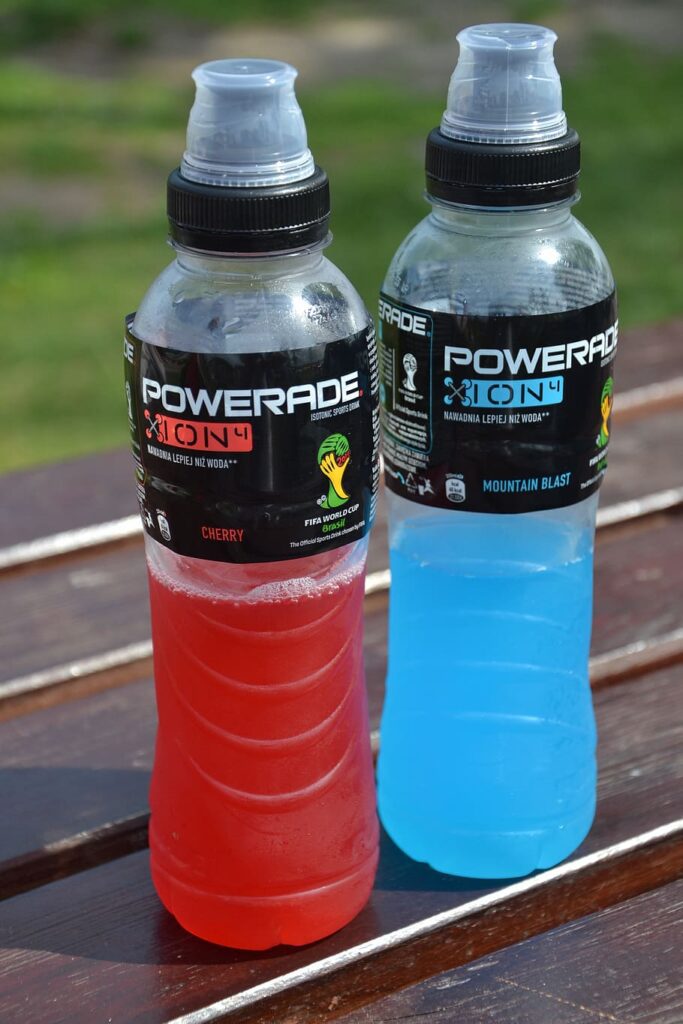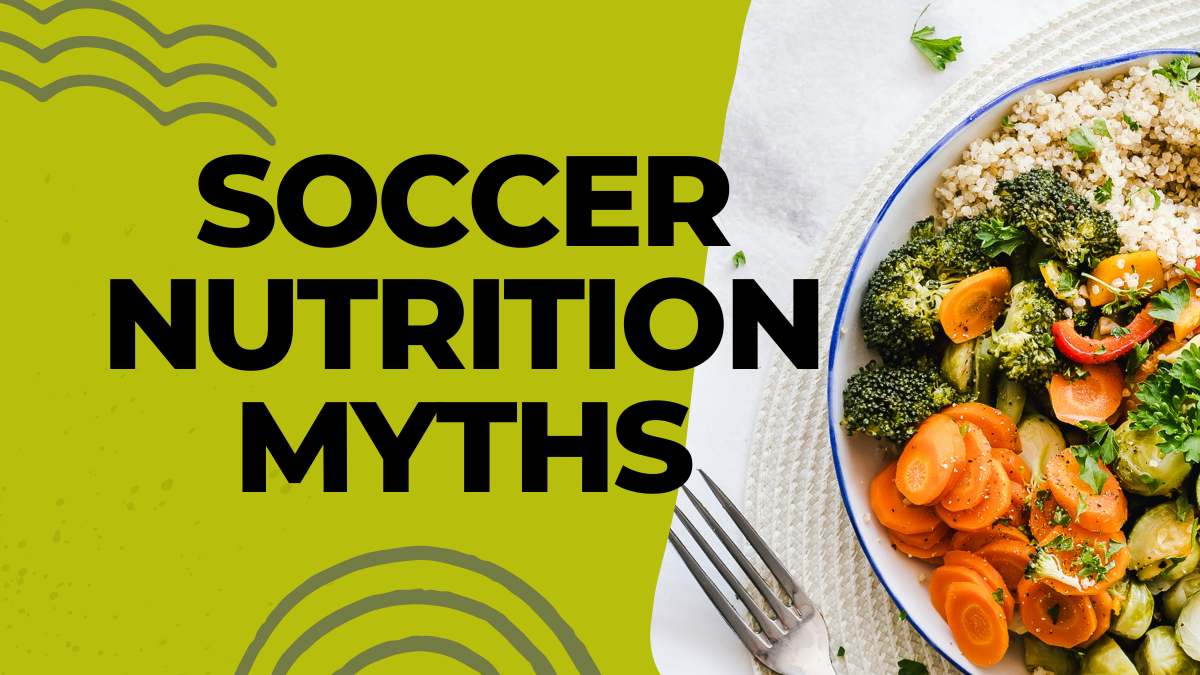Soccer Nutrition Myths: Debunking 5 Common Misconceptions
Playing soccer at a high level takes a toll on your body. In fact, playing soccer at any level can be physically demanding as you will have to spend a lot of energy. This is why soccer players need to eat a healthy diet. However, many soccer nutrition myths in circulation can have a negative impact on player performance.
When it comes to nutrition, we must separate fact from fiction. Myths often spread like wildfire because people do not look for the truth. So, we will try to debunk some of the most common soccer nutrition myths in this article.
By providing evidence-based information, we will also provide you with some practical nutritional tips that you can easily implement into your diet. If you want more tips on soccer nutrition, make sure to read our comprehensive guide on soccer nutrition 101.
So without further ado, let’s dive in and debunk these common soccer nutrition myths once and for all.
Myth 1: Performance during a soccer match is not affected by what you eat

This is surprisingly a very common myth because many players believe that soccer is only technical and there’s no need to improve your diet to play better. Moreover, since playing soccer involves a lot of running, people believe that playing without eating anything is rather beneficial. There may be some truth behind this but this myth overlooks the crucial role of nutrition in fueling optimal performance.
Debunking the myth
Contrary to the belief that food has no impact on performance, numerous studies have shown that there’s a clear link between nutrition and soccer performance. What you eat before a match can significantly affect your energy levels, endurance, and cognitive function on the field.
Soccer players rely heavily on glycogen, the stored form of carbohydrates, to power their muscles during intense exercise. Consuming adequate carbohydrates before a match ensures optimal glycogen stores, leading to improved stamina and performance.
Moreover, a well-balanced meal includes carbohydrates, proteins, and healthy fats, along with vitamins and minerals. All these macronutrients provide the necessary fuel and nutrients for sustained energy release. Proteins also help in muscle repair and recovery, while fats contribute to overall energy production and hormone regulation.
Therefore, your performance on the field is definitely affected by the work you put off the field and in your kitchen!
Myth 2: All fats are bad for you

The myth that all fats are inherently bad for you has misled many soccer players in their dietary choices. This misconception stems from the general belief that fat is associated with weight gain and negative health outcomes. However, it is essential to differentiate between healthy fats and unhealthy fats so that we better understand the role of fats in our well-being.
Debunking the myth
Not all fats are created equal. Healthy fats, such as monounsaturated and polyunsaturated fats, are quite important for the body. These fats can be found in foods like avocados, nuts, seeds, and fatty fish like salmon. They not only provide essential fatty acids but also promote heart health and support brain function.
Healthy fats are an integral part of a well-rounded diet for soccer players. They provide a concentrated source of energy, which can be beneficial for endurance during matches and training sessions. Moreover, they contribute to hormone production and help reduce inflammation in the body, supporting optimal performance and recovery.
Incorporating healthy fats into your diet can contribute to your improved performance and overall well-being. Remember, fats are an essential macronutrient that should not be demonized but rather embraced as part of a balanced approach to nutrition.
Myth 3: You should drink a lot of water during a game

A prevalent myth in soccer is the belief that one should drink a substantial amount of water during a game to stay properly hydrated. While hydration is indeed crucial for optimal performance, the notion of consuming excessive amounts of water during a match is a misconception that needs to be debunked.
Debunking the myth
Don’t get me wrong, hydration definitely plays a vital role in maintaining physical and cognitive function during a game. It is important to stay hydrated to perform at your best but drinking a lot of water during the game can sometimes be detrimental because it will make you extremely bloated. As a result, you won’t be able to run longer and play at your absolute best.
Hydration requirements can vary depending on factors such as body size, sweat rate, environmental conditions, and individual tolerance. Simply drinking a lot of water without considering these factors can be ineffective and potentially detrimental.
Moreover, while water is essential for hydration, solely focusing on water intake neglects the importance of electrolytes, such as sodium, potassium, and magnesium. These electrolytes are lost through sweat and need to be replenished to maintain proper hydration and electrolyte balance.
Therefore, try to understand that it is important to stay hydrated for optimal performance but don’t try to drink gallons of water during the match itself. Instead, you should be properly hydrated throughout the day and you should only consume small sips of water during training/match.
Myth 4: Drinking sports drinks is always necessary for hydration

Among soccer athletes, there’s another myth that drinking sports drinks is always necessary for proper hydration during a game. While sports drinks can serve a purpose in specific situations, the belief that they are always essential for hydration is a misconception that needs to be addressed.
Debunking the myth
I’m not understating the importance of sports drinks because they can have a host of benefits. Sports drinks are designed to provide hydration, electrolytes, and carbohydrates to athletes during training and matches so that the athletes can play for a longer period. These drinks can be beneficial for replenishing electrolytes and providing a quick source of energy during extended periods of physical activity.
However, soccer matches typically last for shorter durations, typically 90 minutes or less, which may not require the same level of electrolyte and carbohydrate replenishment as longer endurance activities. For most soccer players, water is often sufficient for maintaining proper hydration levels during a game.
Moreover, many sports drinks contain high amounts of added sugars, which can contribute to unnecessary calorie intake. Consuming excessive amounts of sugary beverages can lead to weight gain, dental issues, and potential energy crashes.
Therefore, it is important to consider the both pros and cons of consuming sports drinks. While you definitely may consume sports drinks a few times, understand that there’s no compulsion for you to do so to stay properly hydrated.
Myth 5: Caffeine is detrimental to performance and should be avoided

There is a widespread myth in the soccer community that caffeine consumption is detrimental to performance and should be avoided. Caffeine, commonly found in coffee, tea, energy drinks, and some supplements, has long been associated with negative health effects and performance drawbacks. However, it’s important to understand the actual impact of caffeine on soccer performance.
Debunking the myth
Research has shown that caffeine can have positive effects on athletic performance. Caffeine has been found to increase alertness, improve focus, enhance endurance, and reduce fatigue. These can be quite beneficial for soccer players on the field.
Caffeine acts as a stimulant on the central nervous system, leading to increased neural activity and enhanced muscle function. It can also enhance cognitive function, reaction time, and decision-making abilities, all of which are crucial for soccer players.
While caffeine can provide performance benefits, it is essential to consume it in moderation and consider individual tolerance levels. Timing of caffeine intake is also crucial, as consuming it too close to bedtime may disrupt sleep patterns.
Consuming caffeine can be a double-edged sword so you need to be aware of what you’re doing. If you’re overindulging yourself in caffeine, then you will have to face some negative consequences. However, by consuming caffeine in moderation, you can utilize its positive effects and improve your performance drastically on the pitch.
Final Thoughts
Remember that what you eat does matter, and fueling your body with the right nutrients can contribute to improved energy levels, endurance, and overall well-being. Embrace the power of healthy fats, listen to your body’s hydration cues, choose hydration strategies that suit your needs, and consider the potential benefits of caffeine when used appropriately.
By staying informed and taking a balanced approach to nutrition, you can fuel your soccer performance and unlock your full potential as an athlete. If you like what you’ve read, check out our articles on the top 7 foods for soccer players and soccer hydration strategies.







